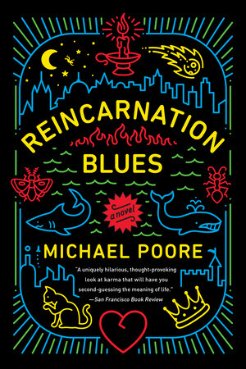This is a story about a wise man named Milo. It begins on the day he was eaten by a shark.
The day didn’t begin badly. Milo woke up before sunrise, tucked his fifty-year-old self into a pair of shorts, and walked out to meditate on the beach. His dog, Burt—a big black mutt—followed.
Milo sat down in the sugar-white sand, closed his eyes, and felt the warm, salt breeze in his beard. He took note of his ponytail feathering against his back, and seagulls crying. That’s what you were supposed to do when you meditated: notice things, without really thinking about them.
Milo was not a particularly good meditator. He cracked open a beer, and watched the sun come up. Meanwhile, as always, the more he tried to think of nothing, the more he thought of ridiculous, noisy shit like his big toe, or France. Maybe he would get a new tattoo.
He drank his breakfast, noticing the ocean, welcoming its ancient indifference. He tried to match its breath—the breath of time itself—and fell asleep, as usual, on the beach with his beer and his dog, until the tide rolled in far enough to wet the sand under his ankles.
He was, perhaps, the crappiest meditator in the world. But he noticed this, accepted it, and let it humble him. Humility was one of the things that made him a wise man.
He walked back to the house to open a new bag of dog food.
The shark that would eat Milo in a few hours was miles away, at that particular moment. It patrolled the surf off St. Jeffrye’s Key, looking for manatees.
The shark knew it was hungry. This required no thought. The shark lived in the moment, every moment, in a perfect equanimity of sense and peace, meditating its way through the sea without even trying.
Milo worked in his garden for a while.
He played with his dog and read a book about fossils.
He went online and spent twenty minutes watching dumb videos.
Then he drove his old pickup truck to St. Vincent’s Hospital, because visiting the sick is an important part of a wise man’s job. He took Burt with him.
Petting dogs was good for people; it was a scientific fact. Burt was a wise man too, in his way.
All animals are.
On this particular day, Milo and Burt visited Ms. Arlene Epstein, who was dying of being a hundred years old.
She was asleep when Milo arrived, and he stood there looking at her for a minute.
Hospitals had an unfortunate way of reducing people, he thought. Looking at Arlene Epstein in her bed, tissue-delicate, you’d never know that she had once been a legendary bartender, keeping rowdy tourists in line with a sawed-off hockey stick.
Burt hopped up and rested his forepaws on the mattress.
“Milo,” yawned Arlene. “Is it Thursday already?”
“Saturday,” he answered, kneeling.
“I always liked Saturdays,” mused Arlene. “I think I’ll die on a Saturday, if I can help it.”
“Not today, though,” said Milo. “You look good.”
“Fantastic,” she replied, sitting up and giving his beard a tug. “You can take me for a walk.”
Arlene was not supposed to go for walks. There was a sticker on her door that said she was a ‘fall risk.’ Milo ignored the sticker, and stole a walker from a closet down the hall.
Arlene took one step about every three seconds. Milo stuck casually by her side, ready like a hair-trigger to catch her. Burt walked along the wall, sniffing like crazy (dogs love hospitals. Think of all the different smells you can never quite get rid of).
When they had traveled ten feet, Arlene asked, “Milo, do you know what happens when we die?”
He was honest with her. He said, “Yes.”
One step. Two steps.
“Well?” she asked.
“You come back as something else.”
Arlene thought about that.
“Like another person?” she said.
“Or a dog. Or an ant. Maybe even a tree. Burt was a bus driver in his last life.”
